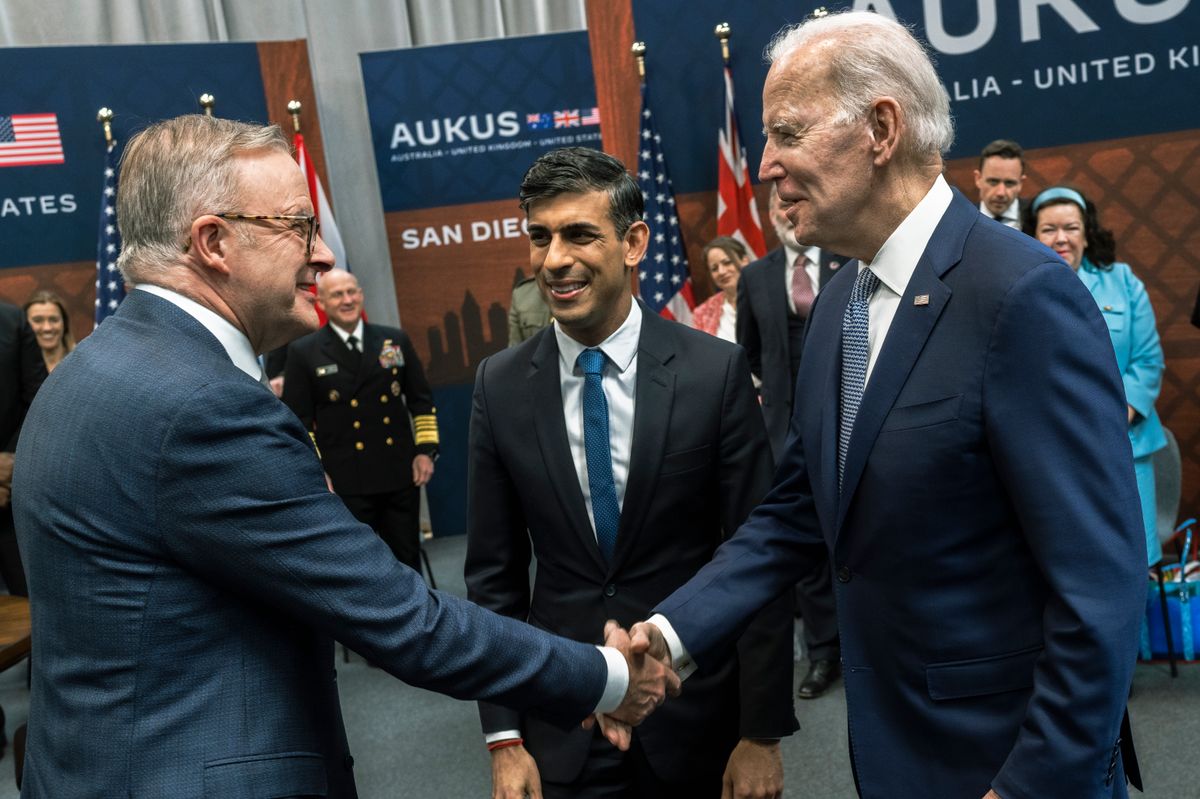Australia Plans Fleet of Nuclear Submarines to Counter China

The Lede: The U.S. plans to sell nuclear-powered submarines to Australia as a western-aligned country positioned against China in the Indo-Pacific under the AUKUS security pact. Australia will begin building its own fleet of nuclear-powered submarines following this initial acquisition.
What we Know:
- On March 14, 2023, the leaders of the U.S., the U.K., and Australia met at Naval Base Point Loma in San Diego, California under the AUKUS pact to discuss naval strategy in the Indo-Pacific region.
- U.S. President Joe Biden, Australian Prime Minister Anthony Albanese, and U.K. Prime Minister Rishi Sunak discussed the future of the three countries and their cooperation on nuclear submarines with the goal of deterring China.
- The meeting resulted in the announcement of a plan for the U.S. to sell Australia its first nuclear-powered submarines for the country to start the process of building a fleet of such naval vessels.
The Background: The U.S. has only shared technology for nuclear-powered submarines once before - with the U.K. in 1959. Nuclear-powered submarines are currently the most advanced type of military submersibles. They have the advantage of stealth due to their greater range, capacity to stay underwater for longer, and potential to avoid detection. (Although they are powered by nuclear energy, they are not necessarily armed with nuclear weapons.) The West’s rapidly growing geopolitical concerns about China in the South Pacific accelerated the increased cooperation between Australia, the U.K., and the U. S. under the AUKUS pact. The agreement’s actions began with the training of Australian sailors and engineers. These developments come as China recently removed restrictions on Australian coal, thawing trade relations.
Likely Outcomes:
- By the early 2030s, Australia is expected to buy between three and five U.S. Virgina-class nuclear-powered submarines. By the 2040s, all three countries plan to coordinate the building and deployment of new state-of-the-art nuclear-powered submarines based on British and American technologies.
- Future AUKUS plans include the rotational deployment of each country's submarines in Australia to maintain the presence of member country vessels in the region.
- Australia will strive to maintain a tight balance with its geopolitical posture along with its AUKUS allies while maintaining sound economic relations as Australia and China have significant mutual trade interests.
Quotables:
- "As we stand at the inflection point in history where the hard work of enhancing deterrence and promoting stability is going to affect the prospects of peace for decades to come, the United States can ask for no better partners in the Indo-Pacific, where so much of our shared future will be written." – Joe Biden, President of the United States
- "Russia's illegal invasion of Ukraine. China's growing assertiveness, the destabilizing behavior of Iran and North Korea all threaten to create a world defined by danger, disorder and division. Faced with this new reality, it is more important than ever that we strengthen the resilience of our own countries." –Rishi Sunak, Prime Minister of the United Kingdom.
- "The latest joint statement from the U.S., U.K. and Australia demonstrates that the three countries, for the sake of their own geopolitical interests, completely disregard the concerns of the international communities and are walking further and further down the path of error and danger," –Wang Wenbin, Chinese Foreign Ministry Spokesman.
Good Reads:
Biden is selling U.S. nuclear submarines to Australia to counter China (NPR)
China says U.S.-U.K.-Australia nuclear submarine deal puts allies on "path of error and danger" (CBS)
China Ends All Restrictions on Australian Coal Imports (The China Paper)
